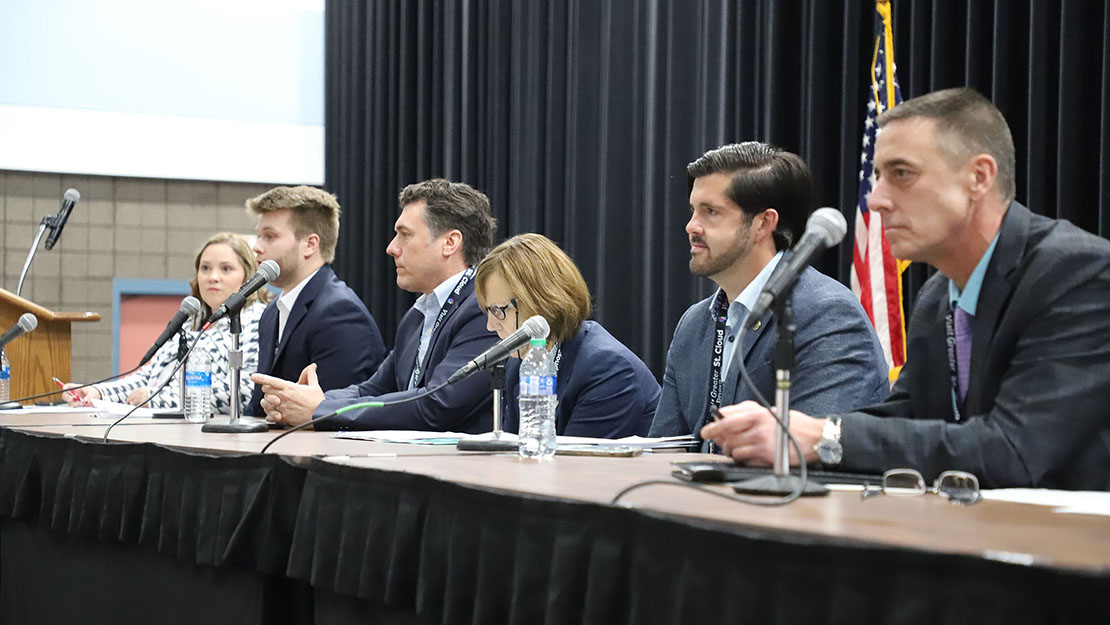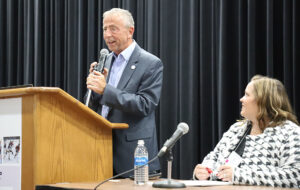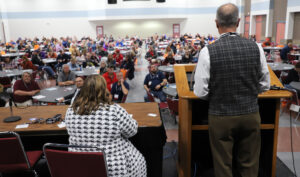Lawmakers from St. Cloud area debate questionable way e-tab legislation passed

E-tabs in the spotlight again
ST. CLOUD — The Allied Charities of Minnesota had the highest attendance for its annual convention in its history, at 830 people. The issue of electronic pulltabs was heard throughout the gathering.
The ACM Annual Convention was at the River’s Edge Convention Center in St. Cloud on Nov. 16 and 17. ACM is an organization comprising licensed charitable gambling organizations from around the state.

There are 194 American Legion posts and Auxiliary units with gambling licenses, which makes Legion charities easily the largest participant in charitable gambling in Minnesota.
For a town hall forum on e-tabs, Sam Krueger, registered lobbyist and executive director for the Electronic Gaming Group, recounted the 2023 legislative session and how the e-tab language skipped the committees.
“In order to get a fair shake at the Legislature, you got to go through the committee process,” he said. “Finally, around mid-April, we were told something is coming and there is nothing you can do about it.”
All session long, the e-tab issue discussed was the open-all button. Charities showed paper pulltabs can be opened at once by hand and not just three at a time, so e-tabs are similar.
When the tax omnibus bill came out of a conference committee, there were six hours left in the session before adjournment, and this bill had new language that went beyond merely the open-all feature, Krueger said. The language removed free plays and bonus games starting in January 2025, and it gave a smidgeon of the tax relief the charities had asked for. The top tax level, at 36 percent, became 33.5 percent, starting July 2023.
“And that is the language we are stuck with today,” Krueger said.
There was a lie perpetuated during the 2023 session — politicians saying the Minnesota Court of Appeals wanted the Legislature to fix the law regarding the 2012 e-tab agreement with the tribes. Krueger said it was never the case. The courts only ruled that the Gambling Control Board improperly communicated a rule via email.
“It certainly didn’t say the Legislature had to do something,” Krueger said.

At the forum, state Rep. Bernie Perryman of St. Augusta said she could not properly represent her district because there was no time.
“There’s nothing illegal about it. It’s just icky,” she said.
State Rep. Dan Wolgamott of St. Cloud said it was the most frustrating thing he has seen in his five years at the Legislature. He noted the next session begins Feb. 12 and it would be good to adjust the law before charities are impacted in 2025.
“We can’t take legal action, but we can take legislative action,” he said.
State Sen. Aric Putnam of St. Cloud sits on the Senate Taxes Committee. He said the matter was more than tribes and charities. He said manufacturers, providers and the Gambling Control Board are factors, too.
He said the open-all feature was not supposed to be part of e-tabs. Krueger corrected the senator and said the very first games approved by the state had open-all feature, as well as bonus games and free plays.
“No one complained until these games took off,” Krueger said.
Putnam added that lawmakers were left with little time and said stuffing the language into an omnibus bill means he would have had to vote against valuable things like tax relief on Social Security income.
Perryman countered, “It should have been pulled out. It should have been a stand-alone. Why couldn’t we have done that for all Minnesotans?”
Wolgamott went against his party last spring and voted against scaling back e-tabs. He said he favored sending the language back to the conference committee.
“There are times you need to stand up and buck your party,” said Keith Franke, a former state representative from St. Paul Park and executive director of Protect Our Charities. “Do what’s right for Minnesota and remove politics.”
ACM Executive Director Rachel Jenner said the main concern of charities across the state is losses in revenue. She fears the games, after January 2025, will be less entertaining and players will drop. Lacking features limits the ability to evolve the games as software updates and improves.
“E-tabs are the future of gaming in Minnesota,” she said.
Perryman said it was irresponsible of lawmakers to pass the e-tab language without a fiscal note. Vetting laws is part of the duty of elected officials, she said.
Franke shared some figures estimating 20 percent losses.
“I personally feel it’s going to be a lot worse than that. People are going to be mad.”
Charitable gambling stats
Jenner, citing recently released figures from the Minnesota Gambling Control Board, said charitable gambling in Minnesota in the 12 months ending June 30 had $4,572,210,494 in gross receipts. Gross receipts are customers paying cash to play the games.
There were $3,907,332,817 in prizes paid to those customers.
That left $664,877,676 in net receipts. Net receipts get turned into two kinds of expenditures by each organization: allowable expenses and lawful purposes.
Allowable expenses are costs related to the conduct of gambling: wages, purchasing games, rent, license scanners, attending the convention. Lawful purposes are charitable donations, program expenditures, regulatory fees and state taxes.
There were $335,195,312 in allowable expenses. There were $330,364,035 in lawful purpose expenditures (LPE for short). Do the math and you see $665,559,347 in total expenditures, which is more than the net receipts. That just means $681,671 in retained funds from the prior year were spent down.
Of the LPE, $193,129,939 went to state taxes and $137,234,097 went to charitable contributions, nonprofit program costs and regulatory fees. It’s easy to notice that more goes to the state than to the many good causes around Minnesota.
Overall, charitable gambling in Minnesota went up 6.4 percent over the prior fiscal year.
New GCB portal
Gambling Control Board Director Tim Mahoney said his staff was asked more questions than anyone could recall, and they were happy to provide answers.
“Our goal is to make you successful,” Mahoney said.
Mahoney spoke about a new computer portal coming out soon. His comments reflected what was printed in the GCB’s Gaming News, that testing is ongoing: “Since each enhancement will need to be completed before the next one can be started to see what effects it has, we do not have an anticipated launch date.”
Mahoney said he called on his agency to mail out the quarterly publication called the Gaming News in an effort to have more gambling managers look at it. He hopes to continue mailing it.
He also spoke about an increase in staffing, citing how the agency has maintained staffing levels for a long time.
Classes at the ACM gathering were on the topics of security, theft prevention, paper pulltabs, bingo, e-tabs, audits, marketing, legal matters, software, inventory, problem gambling, oversight of sellers, new ideas, best practices — and staying out of the Gaming News.
The Gaming News lists citations issued by the Gambling Control Board. That’s why no organization wants to find itself listed in the Gaming News.
Click here to read the American Legion’s 2024 legislative stance on charitable gambling.



